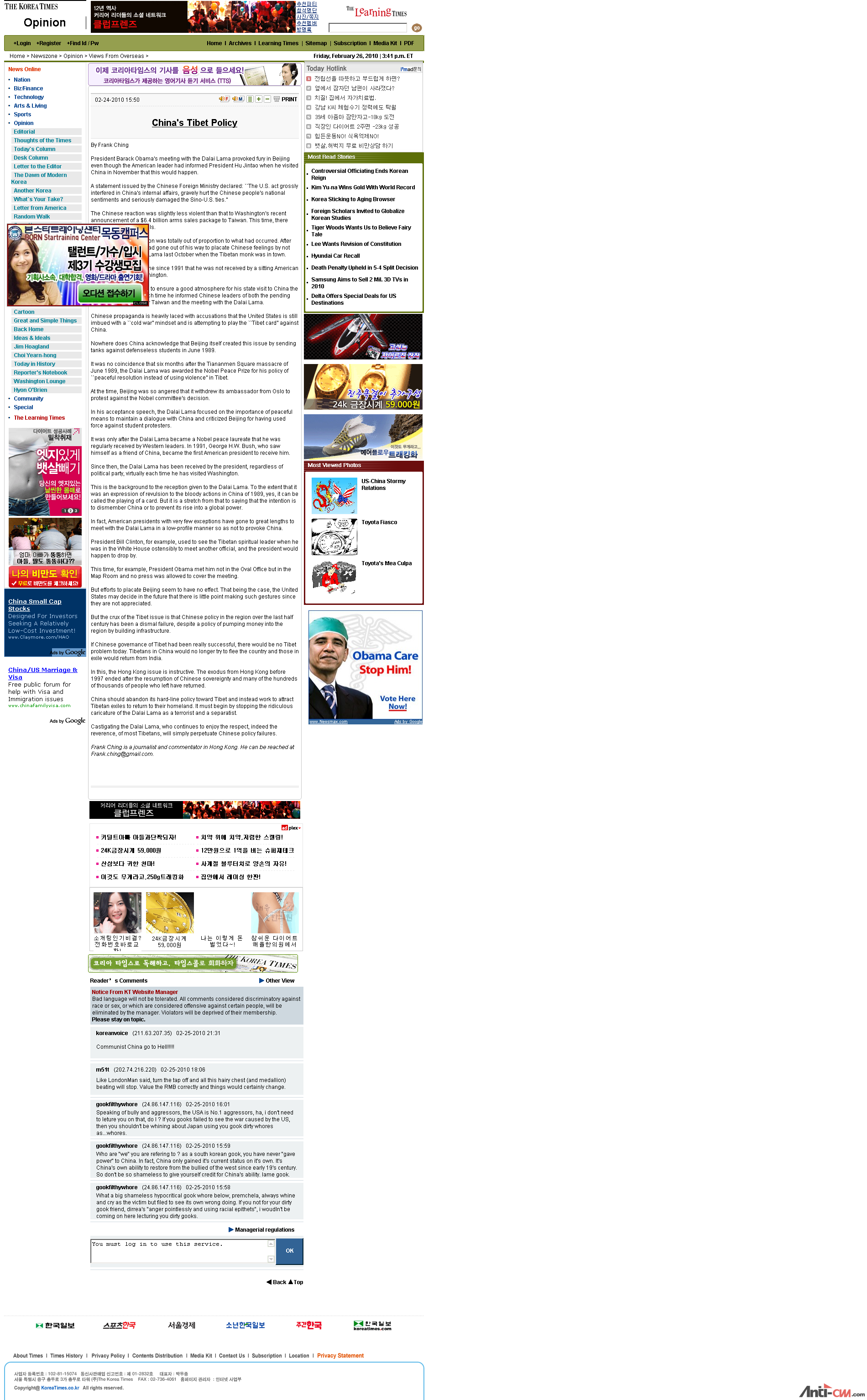|
|
【原文链接】http://www.koreatimes.co.kr/www/ ... 0/02/137_61345.html
【作者】Frank Ching
【原文】
President Barack Obama's meeting with the Dalai Lama provoked fury in Beijing even though the American leader had informed President Hu Jintao when he visited China in November that this would happen.
A statement issued by the Chinese Foreign Ministry declared: ``The U.S. act grossly interfered in China's internal affairs, gravely hurt the Chinese people's national sentiments and seriously damaged the Sino-U.S. ties.''
The Chinese reaction was slightly less violent than that to Washington's recent announcement of a $6.4 billion arms sales package to Taiwan. This time, there was no threat of reprisals.
Still, the Chinese reaction was totally out of proportion to what had occurred. After all, President Obama had gone out of his way to placate Chinese feelings by not meeting with the Dalai Lama last October when the Tibetan monk was in town.
In fact, it was the first time since 1991 that he was not received by a sitting American president while in Washington.
The U.S. leader wanted to ensure a good atmosphere for his state visit to China the following month, at which time he informed Chinese leaders of both the pending arms sales package for Taiwan and the meeting with the Dalai Lama.
Chinese propaganda is heavily laced with accusations that the United States is still imbued with a ``cold war'' mindset and is attempting to play the ``Tibet card'' against China.
Nowhere does China acknowledge that Beijing itself created this issue by sending tanks against defenseless students in June 1989.
It was no coincidence that six months after the Tiananmen Square massacre of June 1989, the Dalai Lama was awarded the Nobel Peace Prize for his policy of ``peaceful resolution instead of using violence'' in Tibet.
At the time, Beijing was so angered that it withdrew its ambassador from Oslo to protest against the Nobel committee's decision.
In his acceptance speech, the Dalai Lama focused on the importance of peaceful means to maintain a dialogue with China and criticized Beijing for having used force against student protesters.
It was only after the Dalai Lama became a Nobel peace laureate that he was regularly received by Western leaders. In 1991, George H.W. Bush, who saw himself as a friend of China, became the first American president to receive him.
Since then, the Dalai Lama has been received by the president, regardless of political party, virtually each time he has visited Washington.
This is the background to the reception given to the Dalai Lama. To the extent that it was an expression of revulsion to the bloody actions in China of 1989, yes, it can be called the playing of a card. But it is a stretch from that to saying that the intention is to dismember China or to prevent its rise into a global power.
In fact, American presidents with very few exceptions have gone to great lengths to meet with the Dalai Lama in a low-profile manner so as not to provoke China.
President Bill Clinton, for example, used to see the Tibetan spiritual leader when he was in the White House ostensibly to meet another official, and the president would happen to drop by.
This time, for example, President Obama met him not in the Oval Office but in the Map Room and no press was allowed to cover the meeting.
But efforts to placate Beijing seem to have no effect. That being the case, the United States may decide in the future that there is little point making such gestures since they are not appreciated.
But the crux of the Tibet issue is that Chinese policy in the region over the last half century has been a dismal failure, despite a policy of pumping money into the region by building infrastructure.
If Chinese governance of Tibet had been really successful, there would be no Tibet problem today. Tibetans in China would no longer try to flee the country and those in exile would return from India.
In this, the Hong Kong issue is instructive. The exodus from Hong Kong before 1997 ended after the resumption of Chinese sovereignty and many of the hundreds of thousands of people who left have returned.
China should abandon its hard-line policy toward Tibet and instead work to attract Tibetan exiles to return to their homeland. It must begin by stopping the ridiculous caricature of the Dalai Lama as a terrorist and a separatist.
Castigating the Dalai Lama, who continues to enjoy the respect, indeed the reverence, of most Tibetans, will simply perpetuate Chinese policy failures.
Frank Ching is a journalist and commentator in Hong Kong. He can be reached at Frank.ching@gmail.com.

|
China, Korea, Policy, Tibet, TIMES, China, Korea, Policy, Tibet, TIMES, China, Korea, Policy, Tibet, TIMES
评分
-
1
查看全部评分
-
|